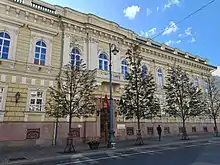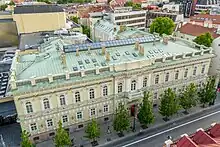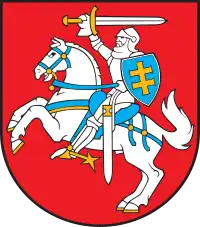Bank of Lithuania
The Bank of Lithuania (Lithuanian: Lietuvos bankas) is the central bank of the Republic of Lithuania. The Bank of Lithuania is a member of the European System of Central Banks. The chairman of the bank is Gediminas Šimkus. Until 2015, the Bank of Lithuania was responsible for managing the former Lithuanian national currency, the litas. It became a part of the Eurosystem when Lithuania adopted the euro on 1 January 2015.
 | |
| Headquarters | Vilnius |
|---|---|
| Coordinates | 54°41′10″N 25°17′00″E |
| Established | 27 September 1922[1] |
| Ownership | 100% state ownership[2] |
| Chairman | Gediminas Šimkus |
| Central bank of | Lithuania |
| Reserves | $1.310 billion[2] |
| Succeeded by | European Central Bank (2015)1 |
| Website | lb.lt |
| 1 The Bank of Lithuania still exists but many functions have been taken over by the ECB. | |


History
The Bank of Lithuania was first established on 27 September 1922.[1] Its first governor was Vladas Jurgutis.[1] The first task of the bank was to replace German ostmark and ostrubel, which circulated after the World War I, with a Lithuanian currency litas. In 1931, the bank became a member of the Bank for International Settlements (BIS) organization.[1]
Primary functions
According to the Bank's official website, the Bank of Lithuania performs these primary functions:
- maintaining price stability,
- formulating and implementing the monetary policy,
- acting as an agent of the State Treasury.
As a member of the European System of Central Banks, the Bank of Lithuania participates in the formulation and implementation of the monetary policy of the eurozone.
Bank leadership
Governors of the Bank of Lithuania:[3]
- Vladas Jurgutis (1922–1929)
- Vladas Stašinskas (1930–1939)
- Juozas Tūbelis (1939)
- Juozas Paknys (1939–1940)
Chairmen of the board of the Bank of Lithuania:[3]
- Bronius Povilaitis (1990)
- Vilius Baldišis (1990–1993)
- Romualdas Visokavičius (1993)
- Kazys Ratkevičius (1993–1996)
- Reinoldijus Šarkinas (1996–2011)
- Vitas Vasiliauskas (2011–2021)
- Gediminas Šimkus (since 2021)
Management and structure
The Bank is governed by a board consisting of a chairperson, two deputy chairpersons and two members.
According to The Bank of Lithuania official website, it is managed by Supervision Service; ten departments: Economics, Statistics, Market Operations, International Relations, Payment Systems, Cash, Accounting, Information Technology, General Services and Security; six autonomous divisions (Internal Audit, Legal, Organisation and Personnel, General and Public Relations, Risk Management), and Bank of Lithuania Branches in Kaunas and Klaipėda.
References
- "Historical timeline". Bank of Lithuania. Archived from the original on 8 February 2023. Retrieved 7 August 2023.
- Weidner, Jan (2017). "The Organisation and Structure of Central Banks" (PDF). Katalog der Deutschen Nationalbibliothek.
- "Historical timeline". www.lb.lt. Archived from the original on 25 November 2020. Retrieved 22 March 2020.
